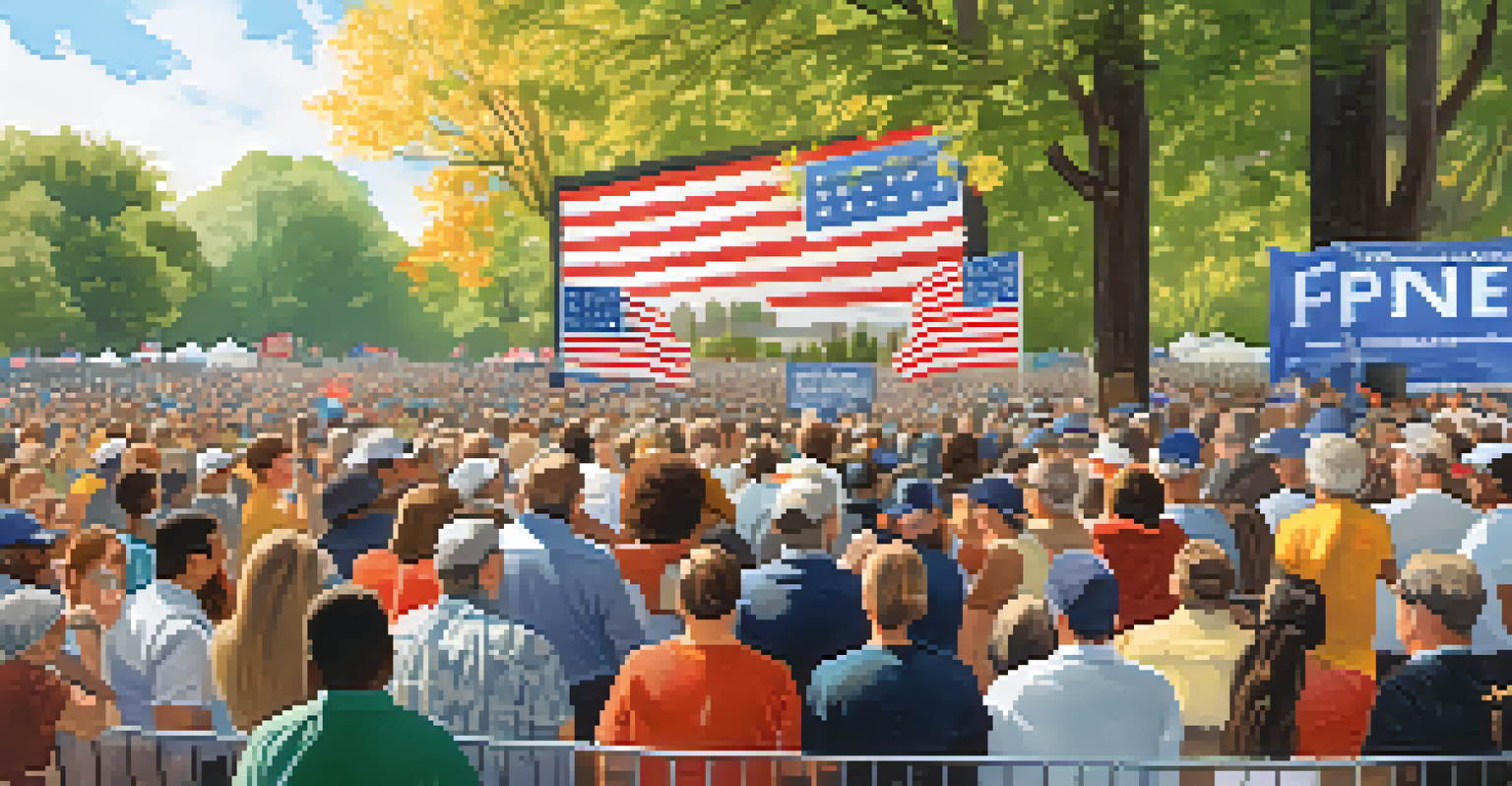Political Parties in Tennessee: Influence and Dynamics

Overview of Tennessee's Political Landscape
Tennessee is known for its rich political history and diverse party affiliations. The state hosts a mix of Democrats, Republicans, and independents, reflecting a range of beliefs and values. This blend creates a dynamic environment in which political parties must constantly adapt to the needs and opinions of their constituents. Understanding this landscape is crucial for anyone looking to grasp the influence of parties in Tennessee.
In politics, an organized minority is a political majority.
The political climate in Tennessee has evolved over the years, influenced by various social and economic factors. Key events, such as the Civil Rights Movement and recent economic shifts, have shaped party dynamics and voter priorities. For instance, urban areas like Nashville and Memphis often lean Democratic, while rural regions tend to favor Republican candidates. This geographical divide adds another layer of complexity to Tennessee's political scene.
In recent elections, voter turnout in Tennessee has varied significantly, affecting party influence. Factors like voter registration laws and outreach efforts by parties play a crucial role in determining who shows up at the polls. Understanding these dynamics helps illuminate the strategies political parties employ to engage voters and secure support.
Historical Context of Political Parties in Tennessee
Tennessee's political parties have roots that trace back to the early 19th century, reflecting the changing tides of American politics. Initially dominated by the Democratic Party, the state began shifting toward Republican ideologies in the latter half of the 20th century. This transition was influenced by national trends, including the civil rights movement and the realignment of conservative voters. Today, this history plays a significant role in shaping party strategies and voter expectations.

Notably, Tennessee was a battleground during the Civil War, which left a lasting impact on its political identity. The post-war era saw the emergence of various factions within the Democratic Party, further complicating the political landscape. As the state transitioned into the 21st century, the Republican Party gained prominence, particularly during presidential elections. This historical context helps explain current party dynamics and voter behavior.
Tennessee's Diverse Political Landscape
Tennessee's political scene features a blend of Democrats, Republicans, and independents, influenced by geographical and social factors.
Understanding the historical context of Tennessee's political parties provides insight into their current influence. Each party has adapted over time to address the unique needs of Tennessee voters, reflecting broader national trends. This adaptability is key to maintaining relevance in a rapidly changing political environment.
Key Political Parties: Democrats and Republicans
The Democratic Party in Tennessee has a rich legacy, often advocating for social justice and economic equality. While it has faced challenges in recent years, particularly in rural areas, the party maintains a strong presence in urban centers. Leaders within the party strive to connect with younger voters and diverse communities, focusing on issues like healthcare and education. This outreach is essential for revitalizing the party's influence in a predominantly Republican state.
The only thing necessary for the triumph of evil is for good men to do nothing.
On the other hand, the Republican Party has gained considerable traction, particularly since the 2000s. With a focus on limited government, fiscal responsibility, and traditional values, the party resonates well with many Tennessee voters. The GOP's success is often attributed to its robust grassroots efforts and the rise of influential figures who have championed conservative policies. These strategies have solidified the party's standing in the state.
Both parties are continuously vying for the hearts and minds of Tennesseans, making it crucial to understand their distinct approaches. The Democrats aim to engage with progressive ideals, while Republicans emphasize traditional conservatism. This competition shapes the political landscape and influences voter turnout during elections.
Influence of Independents and Third Parties
Independents and third parties play a critical role in Tennessee's political dynamics. Often viewed as the wildcards of elections, these groups can sway the outcome by attracting disenchanted voters from the two major parties. Their influence was particularly evident in the 2016 and 2020 elections, where independent candidates garnered significant attention. This highlights the importance of understanding their motivations and concerns.
Third parties, such as the Libertarian Party, have gained traction by appealing to voters who prioritize issues like personal freedom and minimal government intervention. Their presence can challenge the established parties to reconsider their platforms and outreach efforts. For example, the Libertarians have successfully positioned themselves as a viable alternative for those seeking a radical shift from the status quo.
Historical Shifts in Party Dynamics
The evolution of Tennessee's political parties has been shaped by historical events, including the Civil War and civil rights movement, leading to a shift toward Republican ideologies.
The growing number of independent voters emphasizes the need for major parties to be more responsive to public sentiment. As independents increasingly reject traditional party affiliations, both Democrats and Republicans must adapt their strategies to capture this crucial demographic. This ongoing evolution is essential for maintaining electoral relevance in a shifting political landscape.
Impact of National Politics on Tennessee Parties
National politics significantly influence local party dynamics in Tennessee. Decisions made at the federal level can resonate deeply with state voters, impacting how parties position themselves. For instance, issues like healthcare reform and immigration policy often generate strong reactions within the state, prompting parties to align their platforms accordingly. Understanding this connection is vital for grasping the broader political landscape.
In recent years, the rise of populism and polarization in national politics has trickled down to Tennessee. The Republican Party has embraced more extreme positions on various issues, while Democrats have responded with more progressive platforms. This national trend has created a heightened sense of urgency for both parties to mobilize their bases and secure voter loyalty. The interplay between national and state politics shapes the strategies they employ.
Tennessee's political parties must navigate these national influences while staying true to their constituents' needs. This balancing act requires constant vigilance and adaptability, as shifts in public opinion can quickly alter the political landscape. Ultimately, the relationship between national and local politics is a crucial factor in understanding party dynamics in Tennessee.
Voter Engagement and Mobilization Strategies
Voter engagement is a cornerstone of effective political strategy in Tennessee. Both major parties employ various tactics to reach out to potential voters, from door-to-door canvassing to social media campaigns. Engaging with voters on issues that resonate with them can significantly influence turnout and party loyalty. Understanding these strategies can provide insight into how parties aim to secure electoral success.
In addition to traditional outreach methods, parties increasingly rely on data analytics to identify and target specific voter demographics. By analyzing trends and preferences, they can tailor their messages to resonate more deeply with potential supporters. For instance, focusing on local economic issues may appeal more to voters in rural areas, while urban voters might prioritize social justice initiatives. This data-driven approach allows parties to be more strategic in their engagement efforts.
Challenges in Voter Engagement
Political parties in Tennessee face hurdles like voter apathy and misinformation, which hinder their ability to mobilize support and engage a diverse electorate.
As voter mobilization becomes more crucial, parties are also investing in grassroots efforts to foster community involvement. Organizing events, forums, and discussions creates a sense of belonging and encourages civic engagement. By empowering local communities, parties can cultivate a more engaged electorate, ultimately shaping the future of Tennessee's political landscape.
Challenges Facing Political Parties in Tennessee
Political parties in Tennessee face several challenges that can impact their influence and effectiveness. One significant hurdle is voter apathy, as many citizens feel disillusioned with the political process. This sentiment can lead to lower voter turnout, making it difficult for parties to rally support. Addressing these issues requires innovative approaches to engage and motivate voters.
Another challenge is the increasing polarization of political beliefs. As party lines become more entrenched, it can be harder for parties to appeal to a broader audience. This polarization often leads to divisive rhetoric, pushing moderate voters away from both major parties. Finding common ground and fostering bipartisan dialogue is essential for overcoming this challenge and building a more inclusive political environment.

Lastly, the rise of misinformation and disinformation campaigns poses a threat to informed voting. As false information spreads rapidly, parties must work diligently to combat these narratives and provide accurate information to voters. Building trust and credibility is crucial for ensuring that constituents feel confident in their choices come election day.